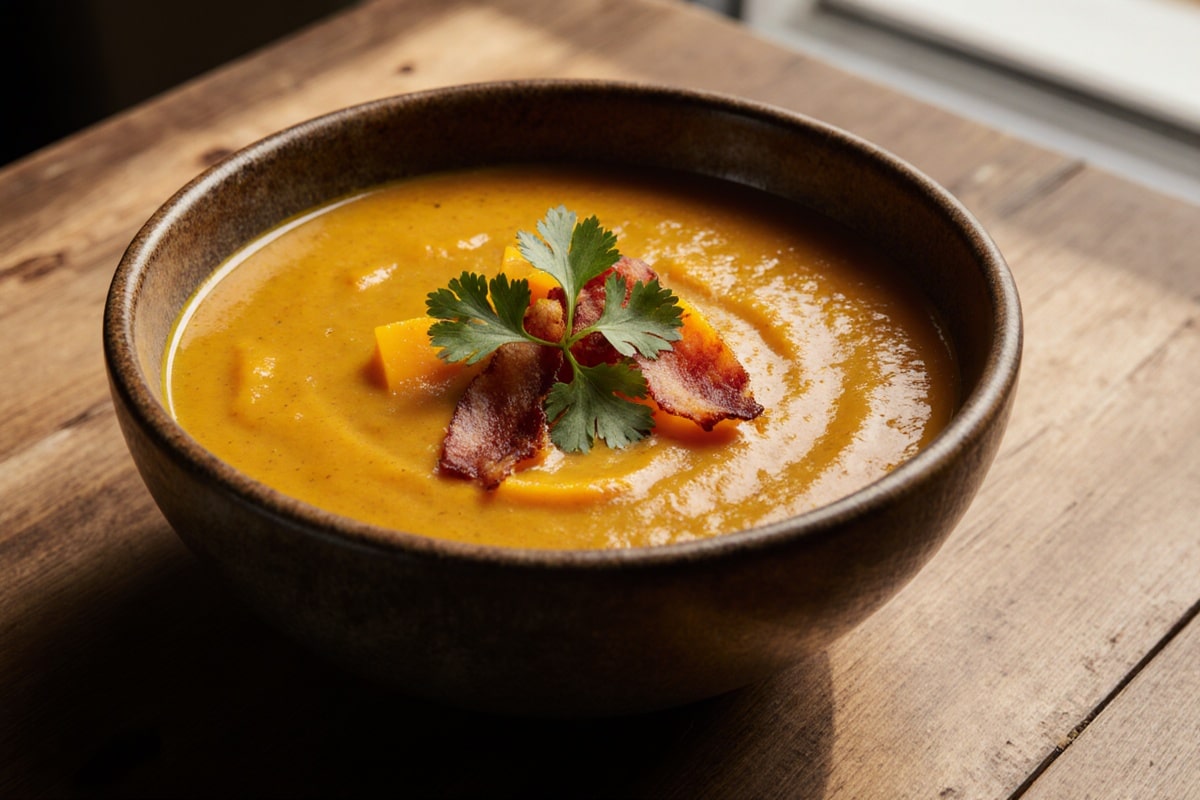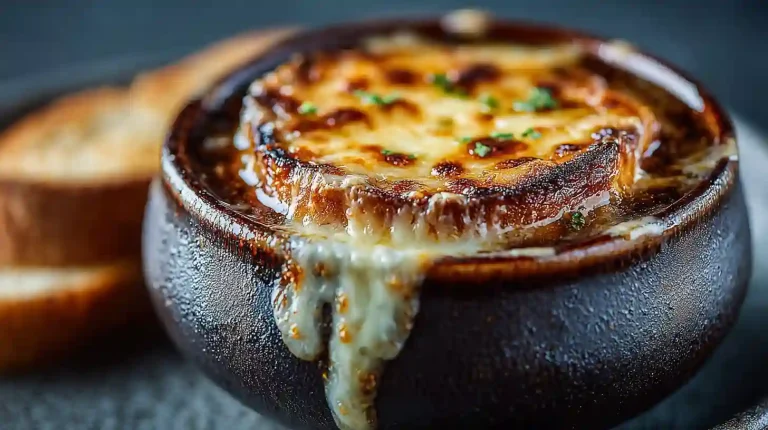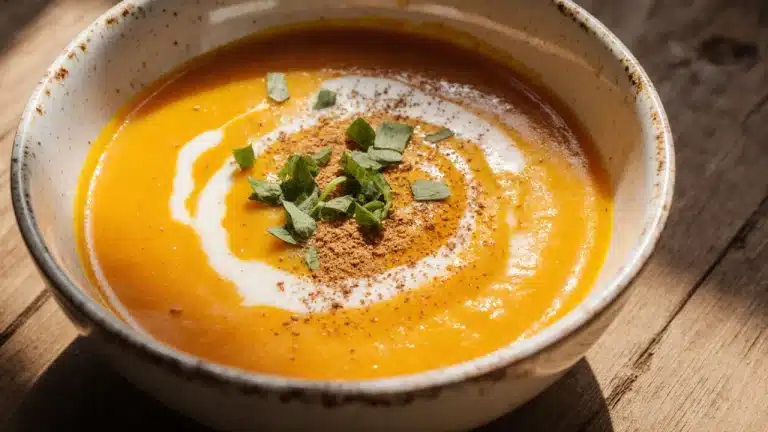Gordon Ramsay’s Ultimate Healthy Butternut Squash Soup: 4 Flavor Secrets
Gordon Ramsay’s butternut squash soup is my culinary redemption story. Years ago, I was the guy who could burn water and turn simple soups into flavor disasters. Then I learned Ramsay’s game-changing techniques that transformed my kitchen from a disaster zone to a precision flavor laboratory. This isn’t just another soup recipe—it’s a lifeline for home cooks drowning in bland, uninspired cooking. What I’m about to share isn’t just a method; it’s a complete flavor revolution that’ll have you creating restaurant-quality soup in your own kitchen. Imagine impressing your family with a soup so rich, so perfectly balanced, that they’ll think you’ve been secretly training in a Michelin-star kitchen. Spoiler alert: you’re about to become that cooking hero.

Gordon Ramsay’s Butternut Squash Soup
Ingredients
Equipment
Method
- Heat olive oil in a skillet over medium heat and sauté onions for 5-7 minutes until golden.
- Add garlic and sauté for another minute until fragrant.
- Add butternut squash and apple; sprinkle with curry powder. Cook for 10-12 minutes, stirring constantly to caramelize.
- Pour in hot vegetable stock, bring to a simmer, and cook for another 10 minutes until the squash is tender.
- Blend the soup until smooth, adjusting seasoning to taste.
- Serve with a swirl of cream and garnish with pancetta crisps and fresh coriander.
Nutrition
Notes
Love this recipe?
Give us 5 stars and comment!The Winter Comfort: Gordon Ramsay’s Butternut Squash Soup Unveiled
Why This Soup Beats Your Average Winter Warmer
Gordon Ramsay’s butternut squash soup is more than just another recipe—it’s a fantastic way to turn simple ingredients into something truly special. What makes this soup stand out is Ramsay’s focus on enhancing flavors, turning ordinary winter squash into a creamy, well-seasoned delight that will have your taste buds cheering.
Winter’s Most Nutritious Comfort Food
This soup isn’t just for comfort—it’s a nutrition winner dressed up as a smooth soup. Butternut squash packs a nutritional punch, offering about 40-50 calories per 100g, while supplying your body with beta-carotene, vitamin C, potassium, and magnesium.
What You’ll Learn: A Flavor Journey
You’ll learn the art of caramelization, how to layer seasoning, and ways to build depth using simple ingredients. This is high-quality cooking made accessible for your home kitchen.
Flavor Architecture: Creamy, Subtle, Bold
The aim? A soup that boasts layered flavors—a rich base, gentle spice notes, and bold seasoning that enhances the squash’s natural sweetness. Think of it as professional-level complexity made easy.
Nutritional Deep Dive: More Than Just Soup
Vitamin Powerhouse
Butternut squash is pretty much nature’s vitamin supplement. One serving offers a solid dose of vitamin A, which promotes eye health, along with approximately 1g of protein, 2-4g of fat, and 7-10g of carbohydrates per 100g serving.
Low-Calorie Nutrition Profile
At only 40-50 calories per 100g, this soup serves up maximum flavor with minimal calorie impact. The high fiber content (1.5-2g per 100g) will keep you feeling full without weighing you down.
Mineral Magic
This soup is hiding some incredible minerals. You can expect around 20mg of calcium, 0.2mg of iron, and about 300mg of potassium per 100g—great for bone health, oxygen transport, and muscle function.
Ramsay’s Flavor Engineering
Core Ingredient Selection
Ramsay and other chefs know that the right ingredients make all the difference. For this soup, you’ll need butternut squash, onions, garlic, curry powder, and the special touch—apples to bring in unexpected sweetness.
Seasoning Techniques
Curry powder isn’t just a spice—it’s a flavor enhancer. Ramsay uses it to highlight the squash’s natural sweetness, while caramelized onions and garlic provide a flavorful base that really stands out.
The Apple’s Transformative Role
An apple isn’t merely a garnish—it’s a building block for texture and flavor. When caramelized alongside the squash, it adds a lovely sweetness and contributes to that smooth mouthfeel.
Garnish Strategy
Think beyond regular toppings. Pancetta crisps offer salty crunch, while fresh coriander leaves add bright, herbal notes. These aren’t just decorations—they’re essential for boosting flavor.
Cooking Method Masterclass
Base Preparation Fundamentals
Start by getting a handle on heat control. Low and slow is the name of the game. Sweat the onions for 5-7 minutes, manage your pan’s temperature carefully, and watch for that perfect golden—not burnt—caramelization.
Caramelization Secrets
Don’t rush caramelizing the squash and apples. Aim for 10-12 minutes on medium heat to really let those natural sugars build up flavors. Keep the ingredients moving—don’t let them sit still. Gentle stirring helps prevent burning.
Blending and Seasoning Precision
Blending is about the right technique, not just power. Use hot stock to keep the temperature up, layer your seasoning, and strive for a smooth, consistent texture that coats the back of a spoon beautifully.
Finishing with Professional Flair
The finishing touch can set your soup apart from typical home cooking. A swirl of cream, a sprinkle of toasted seeds, or a dash of chili oil can turn your soup from good to fabulous.
Avoiding Common Culinary Landmines
Heat Management
Burning squash is the quickest way to ruin your soup. Keep an eye on the heat, add oil when needed, and stay close while caramelizing the vegetables.
Seasoning Strategy
A bland soup? That’s a major no-no. Season generously at every stage—when sautéing, when adding stock, and during the final taste test. Always remember to taste.
Caramelization Commitment
Patience isn’t just a good idea—it’s essential in cooking. Let those natural sugars develop slowly.
Stock Temperature Wisdom
Always start with hot stock and let it simmer gently. This keeps the ingredients intact and speeds up cooking.
Global Soup Transformations
International Flavor Journeys
Switch out curry for ginger and lemongrass for an Asian twist. Use smoked paprika and chipotle for a Mexican flair. A splash of coconut milk can turn this into a rich, creamy bisque.
Roasting vs. Stovetop Debate
Roasting (at 350-425°F for 40-50 minutes) brings out a deeper sweetness compared to stovetop cooking. Both methods offer unique flavors—give them both a shot to see what you love.
Perfect Pairing Companions
Enjoy your soup with crusty artisan bread, grilled cheese, or herbed croutons. A lightly dressed green salad adds a great acidic balance.
Garnish Gallery
Boost your soup with toasted pumpkin seeds, a dollop of crème fraîche, or a bold swirl of chili oil. These aren’t just toppings—they’re punctuation for flavor.
Video tutorial: butternut squash
FAQ – gordon ramsay butternut squash soup
Question: Can I use frozen butternut squash?
Answer: Fresh is best, but frozen works in a pinch. Just drain excess moisture thoroughly.
Question: How do I make this soup vegan?
Answer: Swap butter for olive oil and use vegetable stock. Easy transformation without losing depth.
Question: What if I mess up the caramelization?
Answer: Low and slow is your mantra. If you burn it, start over—no shame in learning.
Conclusion
Listen up. This soup is more than ingredients—it’s a statement. When you nail this recipe, you’re not just cooking; you’re conducting a flavor symphony. Feel the steam rising, catch that incredible aroma of caramelized squash and subtle curry, and know you’ve just leveled up your cooking game. Every spoonful is a middle finger to boring, bland cooking. You’ll taste complexity, nutrition, and pure culinary confidence. The kitchen is your battlefield, and this soup? Your first victory. Ramsay didn’t just teach me a recipe; he taught me to cook with swagger. Now it’s your turn. Get in that kitchen, roll up those sleeves, and show that squash who’s boss.









